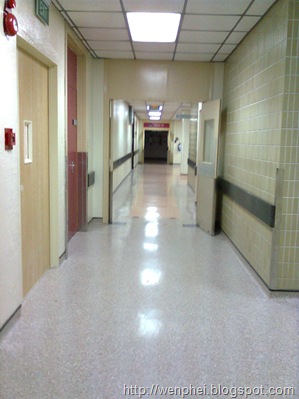以下这段文章转载自 http://wenphei.blogspot.com/
“Sigh, another PD patient.”
*Parkinson’s Disease
30 patients under a team, with one House Officer and one Medical Officer. Two Medical Officers on leave. Team on post-take. The sombre mood reflected not the glorious rays of fresh sunlight that had started to peek through the screens.
And despite all the compassion, love and empathy doctors were expected to have, it was impossible not to flinch when one sees a new PD patient admitted to the ward. Impossibly difficult to manage, long-standing medical and psychosocial issues made admission periods longer, discharge dates postponed – and with every passing moment, the patient is exposed to hospital-acquired infections, especially in this day and age of A(H1N1).
The first doctor to see this patient holds his head in between his thumb and index finger; so many medical issues, where does one begin?
Primary diagnosis: Parkinson’s Disease.
Co-morbidities: Previous stroke in 2006, with left-sided weakness. Diabetes mellitus. Hypertension. Dyslipidemia. Ischaemic Heart Disease. Social issues (no caregiver).
The pen rested on the paper, soon enough, a blot was formed; stagnant was the pen held by the hand of the mind that could not start.
As early as 8.40am into the morning, one hour into the ward round, the morale of junior doctors hit rock bottom. The team was already at its 4th PD patient, all with multiple medical and social issues.
“Very difficult cases, very difficult, need multidisciplinary approach. Need to call the neurologist, endocrinologist, cardio team, respi team, ask them to come and review the patient. Ask nurses to change the urinary catheter due to suspected UTI, start antibiotics STAT. Get the Medical Social Worker to review patient and do means testing. Call Physiotherapist. Have to do all of this before 12pm….” droning like a song in the junior doctor’s heads.
The team arrives at the last patient of the morning, a 64-year old Chinese man.
The MO hastily opens the file. “Mr XXX is a 64/M/Chn, Parkinson’s Disease admitted for respite care. Past medical history of previous stroke in 2006, with left-sided weakness. Diabetes mellitus. Hypertension. Dyslipidemia. Ischaemic Heart Disease. Social issues (no caregiver).”
The MO catches his breath, and looks up to see if anyone was listening.
“What medication is the patient on? Mardopa? Any titration needed?” Registrar 1 asks. HO flips medical record file. Mumbles dosage.
“Anybody talked to the patient’s daughter or not?” asks Registrar 2.
Questions abound, while the HO and MO grapple to answer, struggling with the unfamiliarity of a new patient.
Furious flipping of casesheets. In the furore, pens fall, sheets of biochemical investigation forms fly all over the ground. HO picks them up. Medical student follows suit. Hastily clips them to back of case file.

Amidst the team’s wild chase to search for clues and answers, one man is calm and unwavering. Like a gentle giant, he towers above his subordinates in the team. The consultant is silent, yet he never once failed to listen to the input his colleagues were putting in. Yet his senses were all awake.
He was the one person, perhaps the only one in the team to look at the patient, the frail man lying in bed. In hospital baju, he lay slumped in bed, raised at 45 degrees. He lay slumped to the left, drooling due to the weakness from his previous stroke. A piece of tissue paper haphazardly slit under his chin, the drool had dried to crust; alas, it must have been there since last night.
The greying consultant gently raised the patient’s leg to test his motor power; and immediately a pang hit the entire team – indeed the pants of this man had been wet with faeces.
Embarrassed, the patient started to cry.
In almost perfect English, in terms of diction and the lilting accent of an educated Chinese man, he spoke in a quivering voice,
“Doctor, I have Parkinson’s Disease.”
The consultant nodded. “Yes I know, sir.”
“I want to die.”
With a flushed face tears came rolling down, drenching the deep creases of that aged face. It was irony, such wicked irony – that I was witnessing the typical mask-like facies of Parkinson’s Disease, a face of stone that was now shedding bitter tears in front of me.
“Don’t say that sir. We will take care of you. We will take good care of you.” As the consultant said this, he used a wet alcohol towel to wipe the tears and crust off the patient’s face.
“Come and help me,” the consultant gestured to his MO. They both pulled the patient into a comfortable position, no longer senget (crooked) in bed. At the behest of the consultant, the top man of this team, nurses scurried to clean the man, change his diapers and pants. And at no point in time did the consultant leave the bedside; he watched as the patient’s dignity was rebuilt, and 15 minutes later, the patient suddenly looked bright – no longer another debilitated face in the cubicles of the general wards.
And this consultant, before he left the bedside, he put his hand on the patient’s shoulder and said again, '”We will take good care of you.”
In the excesses and complexities of the systems we work for and work in, we often stray out of the fundamentals of clinical practice – sharpening our senses, opening our eyes to see what the patient has to say and show. Often enough it stems from a heart that is intent on caring for the charges under our care. Easier said than done, but somebody has to take that crucial step.
介绍一下作者 —— Wen Phei. 她是Ah Yen哥哥的医科同学。因为上次去台湾旅行,所以结识了她。她就是个很开朗,搞笑的人。很喜欢读她的blog,觉得如果她不当医生,做个作家其实也很好。
当一个人说"I want to die" 的时候,心态是怎样的?读到那里,我都难过得想哭。一个人没有尊严地活着,真的比死还要难受。Wen Phei 说这件事,让她想了很多。读她的blog 也让我想了很多。
希望也让你想了很多。


No comments:
Post a Comment